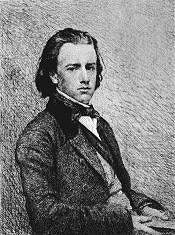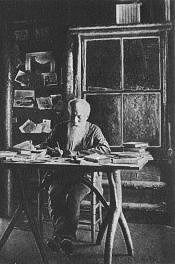|
 |
John Burroughs was born on April 3, 1837 on his
family's farm in Roxbury. He spent his youth working on the farm and
exploring Old Clump Mountain. His favorite place he called Boyhood
Rock, where he would sit and study the ways of Nature around him.
He was a teacher, a journalist, a treasury
clerk in Washington, DC (where he met and befriended Walt Whitman),
and a bank examiner before returning to his beloved Catskills. In
1871, his first book Wake Robin was published. In 1874 he
bought a small farm in Esopus, and devoted himself completely to his
writing. Later, he would divide his time between
"Slabsides", his summer retreat at West Park, near Esopus,
and "Woodchuck Lodge" in Roxbury. |
|
 |
His essays ranged from studies of birds and
nature to religion and literature. Burroughs was a staunch defender
of Whitman and Thoreau, then unpopular beacause of their perceived
literary excesses. But the writing he is best known for are his
gentle observations of nature. Alf Evers in The Catskill: From
Wilderness to Woodstock noted that the first verse of the poem Waiting
expresses this "serene acceptance of life" by Burroughs:
Serene I fold my hands and wait
Nor care for wind, nor tide, nor sea;
I rave no more 'gainst time or fate,
For lo! my own shall come to me. |
|
 |
Over the years, Burroughs wrote 23 volumes of
essays, 3 of which were published posthumously. In later years his
guests at Woodchuck Lodge included John Muir, Henry Ford, Thomas
Edison and Harvey Firestone.
He died on March 29, 1921 on a train returning
from California. He was buried on his 84th birthday, by Boyhood Rock
on Old Clump Mountain in Roxbury.
"John Burroughs - Boy
And Man" by Clara Barrus (1920)
|







